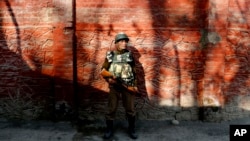Pakistan’s prime minister has harshly criticized rival India for using “delaying tactics” to resolve the long-running territorial dispute over Kashmir. Relations between the two nuclear-armed neighbors have plunged to new lows in recent months and their armies have regularly traded cross-border fire in the disputed region.
Pakistan officially observes a so-called Kashmir Day every year on the fifth of February to pledge its “political, moral and diplomatic” support for separatist groups fighting Indian rule in the divided Himalayan region.
In his message on this year’s annual day, Pakistani Prime Minister Nawaz Sharif accused Indian security forces of committing human rights violations in Kashmir, a predominantly Muslim region.
Later, Sharif traveled to the capital of Pakistani Kashmir, Muzaffarabad, to address the region’s legislature.
The prime minister said despite the “delaying tactics” India has been employing, Pakistan has always sought a “meaningful and result-oriented” dialogue to settle the Kashmir dispute. He emphasized lasting regional peace is linked to the resolution of the conflict and any agenda for talks with India must contain Kashmir. Sharif again described Kashmir as Pakistan’s “jugular vein.”
India has long accused Pakistan of secretly arming and training militant groups in Kashmir, but has never objected to Islamabad’s contacts with Kashmiri leaders demanding a peaceful end to New Delhi’s rule in the region. Unlike his predecessors, however, Indian Prime Minister Narendra Modi strongly opposes any contacts and canceled long-awaited high-level talks with Pakistan in August, citing a meeting between leaders from Indian Kashmir and the Pakistani envoy in New Delhi.
The tensions prompted armies of the two countries to regularly trade fire across the disputed Kashmir border with both sides accusing each other of initiating the conflict in violation of a decade-old mutual cease-fire. The clashes have caused mostly civilian deaths on both sides and displaced thousands of people.
Border tensions in Kashmir appear to have subsided in recent days; but, speaking recently at a seminar in Islamabad, the former editor-in-chief of The Hindu newspaper, Siddharth Varadarajan, said he did not expect improvement in the situation anytime soon.
“The bad news is that I do not foresee the prospect for the resumption of dialogue at any time in the next five or six months. I think the kind of barren patch that we are going through right now will continue for some time. The government of India could agree to dialogue, but whether that dialogue would produce something substantive would depend on the level of trust that India has in Pakistan and Pakistan has in India,” said Varadarajan.
Pakistani leaders say they want resumption of the peace dialogue, but that the initiative rests with India because it canceled the latest planned meeting. New Delhi also demands Islamabad rein in Pakistan-based Islamic groups allegedly involved in terrorist attacks on Indian soil and fueling troubles in Kashmir.




